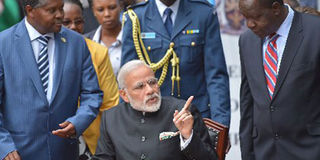India to help Kenya build key cancer centre

India's Prime Minister Narendra Modi (center) speaks with Education Cabinet Secretary Fred Matiang'i (right) and University of Nairobi Vice-Chancellor Peter Mbithi on July 11, 2016 at the institute. Mr Modi said India was ready to help Kenya inject efficiency into its health institutions. PHOTO | AFP
What you need to know:
- India also gave Kenya a Sh4.5 billion loan to revive the ailing Rift Valley Textile (Rivatex) factory in Eldoret and extend affordable credit to small and medium-scale enterprises.
- The donation will bring relief to cancer patients at the KNH who have been going for days without treatment due to the occasional breakdown of old equipment.
- It will also conduct research and training, saving the country Sh10 billion used annually by cancer patients seeking treatment in India.
Kenya is set to construct a top-notch cancer treatment centre at the Kenyatta National Hospital, Nairobi, with assistance from India.
The Asian country has donated a high calibre radiotherapy machine to the referral hospital, which will radically change the treatment of the killer disease by focusing on the cancerous area.
India also gave Kenya a Sh4.5 billion loan to revive the ailing Rift Valley Textile (Rivatex) factory in Eldoret and extend affordable credit to small and medium-scale enterprises.
These were among seven agreements signed Monday during a meeting between President Uhuru Kenyatta and visiting Indian Prime Minister Narendra Modi at State House, Nairobi.
Cabinet Secretaries and Principal Secretaries also attended the meeting.
Mr Modi said India was ready to help Kenya inject efficiency into its health institutions and reduce the cost of drugs for cancer, tuberculosis and HIV/Aids patients.
“India can now join hands with you in your bid for an efficient health system. The efforts will help make Kenya a regional medical hub. We are starting by donating a cancer machine to Kenyatta National Hospital,” he said.
India also gave essential medicines for the treatment of TB and HIV/Aids.
The latest radiotherapy machine, which is estimated to cost Sh300 million, is one of the latest top-of-the-range technologies from India. It will be used from October.
The donation will bring relief to cancer patients at the KNH who have been going for days without treatment due to the occasional breakdown of old equipment.
Health Principal Secretary Nicholas Muraguri on Monday said preparations for the installation of the machine started two months ago.
“We have retired one of the old machines. They (India) sent in a nuclear scientist and physicist for the preparations. We have 1,000 cancer patients on the waiting list. We hope they will be receiving services by October,” he said.
COST-SAVING
He added that the machine would treat cancer in a way that is different from the old system where tissues surrounding the tumour were damaged.
“This machine provides pinpoint therapy. In the past, treatment of cancer was like throwing a bomb in an area, which will cause collateral damage; but with this one, you zoom into the cancerous area without damaging surrounding tissues,” he said.
India also agreed to finance the construction and equipping of a cancer hospital in Kenya. The facility will provide advanced surgery, chemotherapy and bone marrow transplant for the East African region, where it is estimated 40,000 people are suffering from cancer.
It will also conduct research and training, saving the country Sh10 billion used annually by cancer patients seeking treatment in India.
President Kenyatta said he was looking forward to the completion of the cancer hospital adding that it would bring quality and affordable treatment closer to Kenyans.
“The Government of India has also offered support to Kenya in health, an area in which their expertise and leadership is globally respected,” he said.
The hospital will be ready in three years. Eventually, India will assist Kenya to put up a pharmaceutical factory to produce generic drugs, including ARVs.
President Kenyatta said the factory would come with knowledge transfer and pharmaceutical technology.
“One of the other things we hope to do, eventually, is creating a drug manufacturing capacity here in Kenya with the support of India,” said the President. “Such an effort would help us produce life-saving drugs needed by many of our citizens, including ARVs.”
Kenya spends more than Sh50 billion annually to import dugs, 80 per cent of which are sourced from India. A total of Sh22 billion goes to ARVs, Sh4 billion to TB dugs and Sh2 billion to malaria drugs.
“I thank you for the generous donation of a consignment of anti-retroviral drugs to Kenya. Kenya relies heavily on generic anti-retroviral drugs manufactured in India and ensuring that these medicines are available to people with HIV/Aids is a top priority for my government,” he said.
JOB CREATION
The two leaders also agreed on a defence pact, with India donating 30 field ambulances to the Kenya Defence Forces.
It also offered Kenya a letter of credit to buy defence equipment. They agreed to share intelligence on terrorism, cooperate in training, and combat drugs and human trafficking.
India and Kenya further agreed on a loan of Sh4.5 billion, of which Sh2.99 billion will help to revive Rivatex, while Sh1.5 billion will be extended as credit to SMEs through IDB Capital Ltd.
“The textile sector is of great importance to Kenya due to its potential for employment creation right from cotton growing to the manufacturing stage. We, therefore, deeply appreciate your support,” said President Kenyatta.
India also handed Kenya “a line of credit facility” of Sh10 billion to mechanise agriculture.
Other agreements were on visa exemption for holders of diplomatic passports, and avoidance of double taxation and prevention of fiscal evasion with respect to taxes on income.
Agreements on cooperation in housing policy development and management, and on the Bureau of India Standards and the Kenya Bureau of Standards were also signed.




